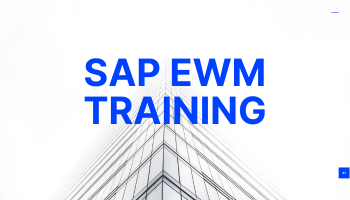Your cart is currently empty.
SAP EWM Training in Bangalore. Cranesoft Provides the Best SAP EWM Training in Bangalore. SAP Extended Warehouse Management (SAP EWM) is a comprehensive software solution developed by SAP AG that focuses on optimizing and automating warehouse and distribution center processes. It is part of the larger SAP Supply Chain Management (SCM) suite and is designed to enhance the efficiency of warehouse operations, inventory management, and order fulfillment.

Online-Classroom
3 Months Duration
Live Class Facilities
Interviews Assured
Live Server
SAP EWM Training in Bangalore. SAP Extended Warehouse Management (SAP EWM) is a specialized software solution developed by SAP for managing and optimizing warehouse processes within the supply chain. It is an integral part of SAP's Supply Chain Management (SCM) suite and is designed to enhance the efficiency and flexibility of warehouse operations. SAP EWM offers a comprehensive set of features to streamline various aspects of warehouse management, ensuring accurate inventory control, efficient order fulfillment, and improved overall logistics processes. We provide the best SAP EWM Training in Bangalore
SAP EWM Training in Bangalore. Effective SAP EWM training typically includes hands-on exercises and practical scenarios to ensure that participants gain real-world experience in using the software. This can involve working on a training system to simulate actual warehouse management scenarios.
SAP EWM Training in Bangalore. As SAP EWM Consultant, As an SAP EWM consultant, you can work for consulting firms or as an independent consultant, helping organizations implement, configure, and optimize their SAP EWM solutions.
As Warehouse Operations Manager, With a strong understanding of SAP EWM, you can pursue roles as a warehouse operations manager. In this position, you would be responsible for overseeing day-to-day warehouse activities, optimizing processes, and ensuring the effective use of SAP EWM.
As Supply Chain Analyst,Professionals with SAP EWM skills are well-suited for roles as supply chain analysts. They analyze and optimize the end-to-end supply chain, utilizing SAP EWM to enhance visibility, efficiency, and responsiveness.
As Logistics Manager,Logistics managers are responsible for coordinating the movement of goods, and SAP EWM professionals can play a key role in managing logistics operations efficiently.
As Inventory Manager,In this role, you would be responsible for overseeing inventory levels, implementing inventory control strategies, and utilizing SAP EWM to optimize stock management.
As Business Analyst - SCM,Business analysts specializing in supply chain management (SCM) can leverage SAP EWM skills to analyze business processes, identify areas for improvement, and implement solutions to enhance overall supply chain efficiency.
As Project Manager - EWM Implementation,Project managers with expertise in SAP EWM can lead implementation projects, ensuring successful deployment, managing project timelines, and coordinating resources effectively.
As SAP EWM Trainer:,Experienced SAP EWM professionals can transition into training roles, sharing their knowledge and expertise with individuals and organizations looking to upskill in SAP EWM.
As Solution Architect - SCM:,As a solution architect, you can design and implement end-to-end supply chain solutions, leveraging SAP EWM to meet the specific needs of the business.
As Logistics IT Manager,Professionals with SAP EWM skills can work in IT management roles within logistics, overseeing the integration and maintenance of IT systems, including SAP EWM.
As Industry-specific Roles,Depending on the industry, SAP EWM professionals can find opportunities in roles tailored to specific sectors, such as pharmaceuticals, automotive, retail, and more from SAP EWM Training in Bangalore.